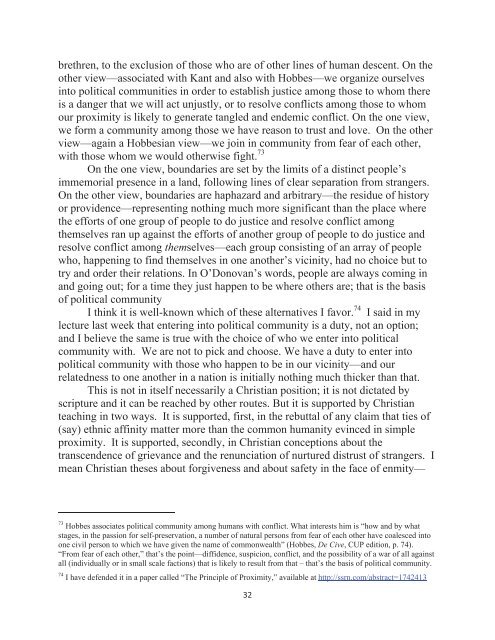International Legal Evangelism: Intelligence, Reconnaissance & Missions
International Legal Evangelism: Intelligence, Reconnaissance & Missions
International Legal Evangelism: Intelligence, Reconnaissance & Missions
Create successful ePaper yourself
Turn your PDF publications into a flip-book with our unique Google optimized e-Paper software.
ethren, to the exclusion of those who are of other lines of human descent. On the<br />
other view—associated with Kant and also with Hobbes—we organize ourselves<br />
into political communities in order to establish justice among those to whom there<br />
is a danger that we will act unjustly, or to resolve conflicts among those to whom<br />
our proximity is likely to generate tangled and endemic conflict. On the one view,<br />
we form a community among those we have reason to trust and love. On the other<br />
view—again a Hobbesian view—we join in community from fear of each other,<br />
with those whom we would otherwise fight. 73<br />
On the one view, boundaries are set by the limits of a distinct people’s<br />
immemorial presence in a land, following lines of clear separation from strangers.<br />
On the other view, boundaries are haphazard and arbitrary—the residue of history<br />
or providence—representing nothing much more significant than the place where<br />
the efforts of one group of people to do justice and resolve conflict among<br />
themselves ran up against the efforts of another group of people to do justice and<br />
resolve conflict among themselves—each group consisting of an array of people<br />
who, happening to find themselves in one another’s vicinity, had no choice but to<br />
try and order their relations. In O’Donovan’s words, people are always coming in<br />
and going out; for a time they just happen to be where others are; that is the basis<br />
of political community<br />
I think it is well-known which of these alternatives I favor. 74 I said in my<br />
lecture last week that entering into political community is a duty, not an option;<br />
and I believe the same is true with the choice of who we enter into political<br />
community with. We are not to pick and choose. We have a duty to enter into<br />
political community with those who happen to be in our vicinity—and our<br />
relatedness to one another in a nation is initially nothing much thicker than that.<br />
This is not in itself necessarily a Christian position; it is not dictated by<br />
scripture and it can be reached by other routes. But it is supported by Christian<br />
teaching in two ways. It is supported, first, in the rebuttal of any claim that ties of<br />
(say) ethnic affinity matter more than the common humanity evinced in simple<br />
proximity. It is supported, secondly, in Christian conceptions about the<br />
transcendence of grievance and the renunciation of nurtured distrust of strangers. I<br />
mean Christian theses about forgiveness and about safety in the face of enmity—<br />
<br />
73 Hobbes associates political community among humans with conflict. What interests him is “how and by what<br />
stages, in the passion for self-preservation, a number of natural persons from fear of each other have coalesced into<br />
one civil person to which we have given the name of commonwealth” (Hobbes, De Cive, CUP edition, p. 74).<br />
“From fear of each other,” that’s the point—diffidence, suspicion, conflict, and the possibility of a war of all against<br />
all (individually or in small scale factions) that is likely to result from that – that’s the basis of political community.<br />
74 I have defended it in a paper called “The Principle of Proximity,” available at http://ssrn.com/abstract=1742413<br />
<br />
32

















